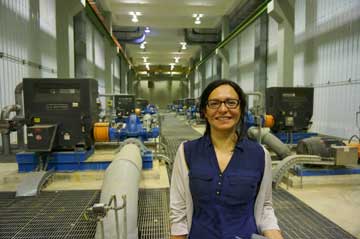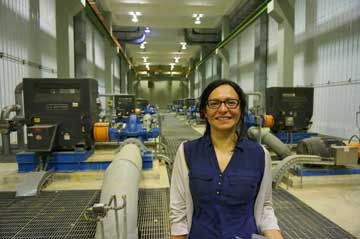 KINGSTON, R.I. – August 12, 2014 — A long shower in Jordan is a luxury. The arid country’s water shortage means that water flows to most homes just once a week, twice in a good week. For residents without stored water or money to buy bottled water, baths, laundry and everything else requiring water must wait.
KINGSTON, R.I. – August 12, 2014 — A long shower in Jordan is a luxury. The arid country’s water shortage means that water flows to most homes just once a week, twice in a good week. For residents without stored water or money to buy bottled water, baths, laundry and everything else requiring water must wait.
Jordanian researchers seeking new water sources have turned to desalination – the process of removing salt from saline water. And they’ve looked to Vinka Oyanedel-Craver, a University of Rhode Island associate professor of civil engineering, to develop nanoparticles to improve the desalination process.
With the backing of a $314,000 grant from the U.S. Agency for International Development and $100,000 from the National Science Foundation, the project launched in early 2014 as a collaboration among researchers in the United States and Jordan.
Oyanedel-Craver’s nanoparticles – microscopic grains of silver — will be embedded in membranes used in the process that eliminates salt from salt water. The nanoparticles slow the growth of bacteria on the membrane. And because the particles are infused into the membrane, there is no need to shut down operations to clean the membrane.
“We can reduce the amount of bacteria that starts growing so the membrane works longer,” Oyanedel-Craver said. “You make it way more efficient and less expensive.”
The team is also seeking environmentally friendly nanoparticles composed of materials readily available in Jordan and nearby countries. That will keep costs down and allow their widespread use by government water suppliers and private well owners alike. The project calls for URI to develop the nanoparticles, Isabel Escobar at the University of Toledo to infuse them in the membrane, and Tequila Harris at the Georgia Institute of Technology to develop the fabrication process. The project runs until July 2015.
Muna Abu-Dalo, an associate professor at the Jordan University of Science and Technology spearheading the project, said the global alliance offers a powerful combination of expertise unavailable at any single institution. Each school brings its own specialty, and for URI, that’s a long history in developing nanoparticles that turn dirty water into potable water. Oyanedel-Craver has led those efforts and been a notable presence at water engineering conferences around the globe.
“She’s very unique in her research, and she’s very good at her research,” said Abu-Dalo, who met Oyanedel-Craver at an engineering conference in 2011.
In July, Oyanedel-Craver spent 10 days in Jordan assisting researchers in preparing their labs. She also toured local water facilities, including a desalination plant about 1,300 feet below sea level. It demonstrated the great lengths required to acquire water and the importance of finding ways to reduce costs.
Traveling to the facility, the signs of water shortage scarcity struck the professor, as did the geopolitical tussles that contribute to them. As a result, Jordanians use about 20 gallons of water per day, five times less than Americans.
“I knew about the problems in Jordan, but being there gave me a personal perspective of the problem,” she said.
Jordanian researchers also gained an American perspective, especially from URI civil and environmental engineering graduate student Colleen Grinham, who spent the month of July in Jordan working with Abu-Dalo and her students. Grinham taught Jordanian researchers how to make the nanoparticles and brought the lab up to U.S. research standards.
“Going places with a purpose is really important to me,” said Grinham, who has been to 30 countries through her studies and personal travel. “With the Syrian refugees, Jordan’s infrastructure and water resources are taking a toll. This work is especially important now.”
Pictured above: URI Professor Vinka Oyanedel-Craver tours a water desalination plant in Jordan. Photo by Colleen Grinham.

